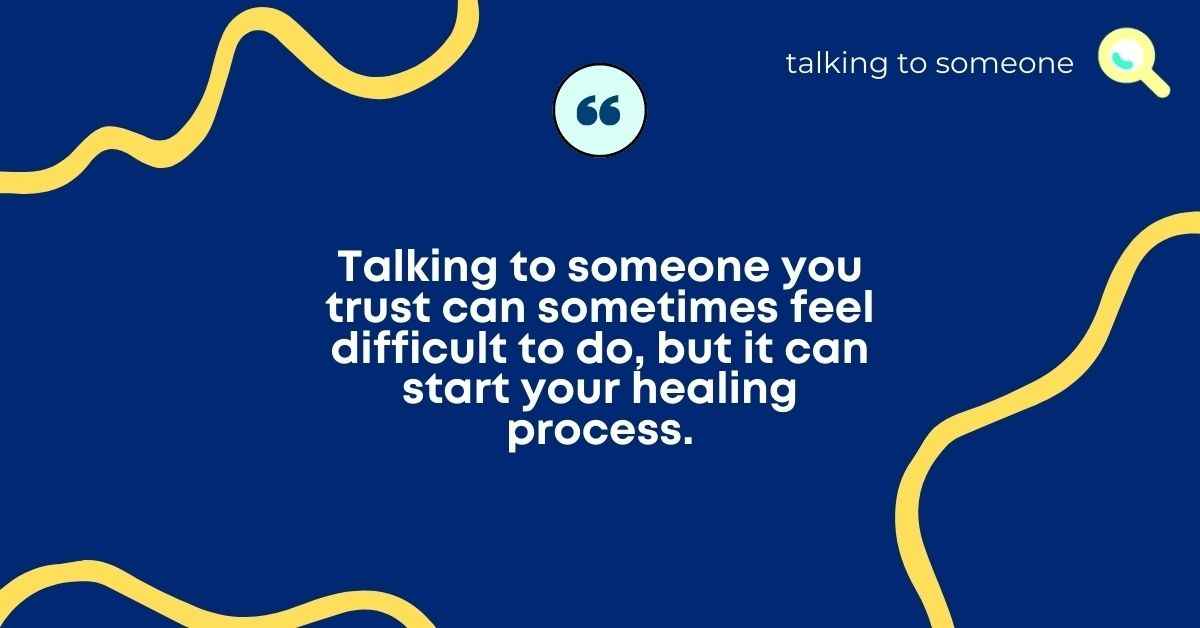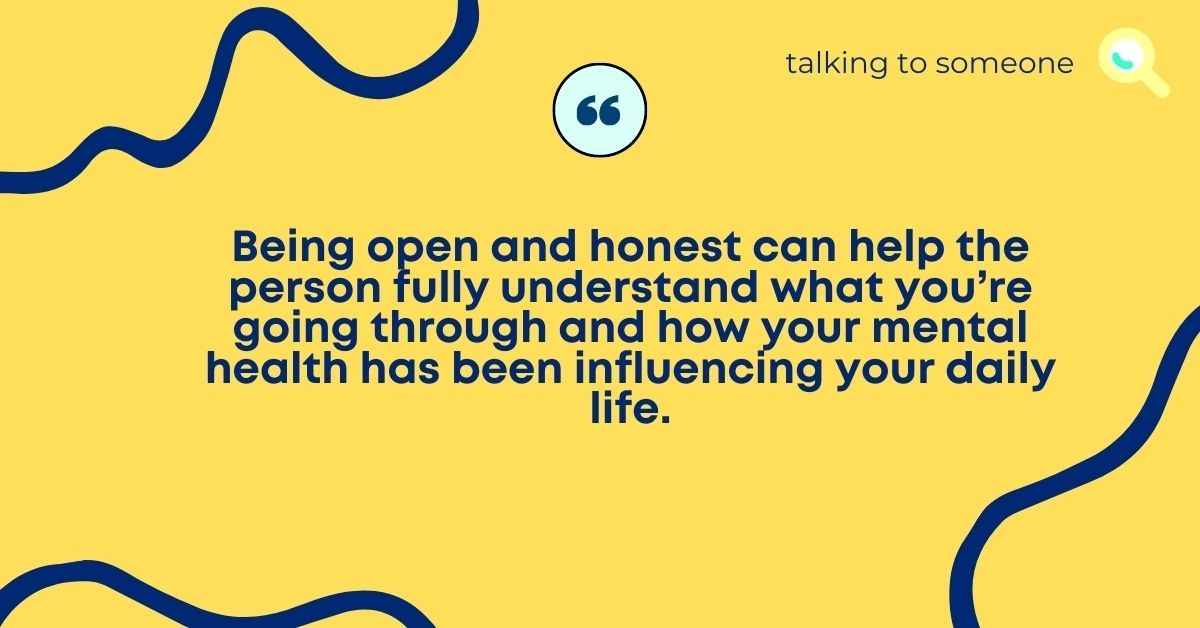Reviewed By Pamela Kirkpatrick - Senior Accredited NCS & Registered Member MBACP Adv. Dip.
Talking To Someone About Your Mental Health
19 May 2021
Starting a conversation about your mental health can be helpful in getting the support you need to feel better. Whether you’ve been diagnosed with a mental health problem or you don’t feel like yourself, talking to someone can help you feel less alone.
Starting a conversation about your mental health can be helpful in getting the support you need to feel better. Whether you’ve been diagnosed with a mental health problem or you don’t feel like yourself, talking to someone can help you feel less alone.
We’ve put together this guide on how to tell someone about your mental health, including tips on how to make it as beneficial and empowering as possible.
Should I talk to my friends or family about my mental health?
Talking to someone you trust can sometimes feel difficult to do. You might feel concerned about how it could affect your relationship, upset someone you love or cause them to worry.

But talking to someone can start your healing process. It also helps the person you trust to understand your symptoms, how they’re affecting you and how they, as a loved one, can help. Having the conversation allows others to see how your behaviour is being impacted, which lessens the pressure you might feel to “be yourself”. Being able to honestly confront your actions, thoughts and feelings creates a safe place for addressing what you’re going through.
Not only is talking about mental health helpful for you, but it helps break the stigma surrounding mental health issues and normalises having this kind of conversation, so more people will feel encouraged to seek help when they need it.
What should I think about before the conversation?
Make a plan
Ask yourself what you want out of the conversation before having it, so you can let your loved one know what your intention is in telling them about your mental health. Having a plan for an outcome helps both you and the other person take steps forward in a way you’re most comfortable with.
Examples of emotional support:
- “I’m talking to you because I know you will listen and not judge me, and I need your support right now.”
- “Telling you this makes me feel [worried/anxious/hopeful/positive] and I’m talking to you because [I feel scared/I need your support/I don’t want to feel like this/I need someone to talk to/I want to feel less alone]”
Examples of practical support:
- “I would like to create a plan to get better and I need your help”
- “I would like you to attend an appointment with me as you will make me feel more at ease”
- “I would like help finding local support”
- Or you could ask for their help in childcare, help with household tasks or maybe they can give you a lift to an appointment

Think time & place
Plan to set aside uninterrupted time so you can both engage in the conversation without feeling pressured or rushed by a time schedule. Likewise, place is equally as important as the time you have to talk. Choosing a location where you feel comfortable will help put you at ease.
Maybe you might prefer to chat when you’re on a walk, having coffee, spending time outdoors or enjoying an activity together, like football or swimming.
Prepare a list
Once the conversation begins, it can feel daunting trying to find the words to express how you feel. Preparing a list of the things you want to discuss can make talking it through easier. You can make notes on your phone beforehand, which can also be a cathartic process of writing down your feelings and exploring the issues you’re concerned about.
Do some research
You can learn more about your feelings and symptoms on our site, where you can get a better understanding of what you’re going through and what your support options are.
Knowing your next steps can help you build a roadmap for getting better and speaking to someone you trust can give you the encouragement to take action.
What if I find a face-to-face conversation too difficult?
If you find talking to someone in person intimidating, don’t feel pressured to speak face-to-face. You could chat by phone or by text if it feels more comfortable.

How do I start the conversation?
Once you feel ready to talk, here are some tips on what to say to get the conversation started:
“I have something on my mind and I would like to talk to you about it”
“I’ve not been feeling like myself lately”
“I’m struggling right now”
“I’m finding it hard to cope”
Even though it can feel uncomfortable sharing these kinds of feelings, you want to give as much information as possible. Being open and honest can help the person fully understand what you’re going through and how your mental health has been influencing your daily life.
Some of the details you could share:
- How you’ve been feeling:
“I’ve been [anxious/suicidal/hard on myself/self-harming/sad/agitated/angry/lonely/low self worth/fearful/overwhelmed/stressed/low energy/unhappy]”
- How long you’ve been feeling this way:
“I’ve felt like this for [days/weeks/months]”
- How these feelings have impacted your day-to-day life:
“I’ve been [more tired than normal/eating less or eating more/antisocial/scared/hearing or seeing things/worried about the future/agitated/quick to anger/unsure what’s real or not real/drinking/taking drugs/feeling guilty/feeling paranoid/feeling bullied/having thoughts of self-harm or suicide/feeling worthless/feeling out of control”
- Let them know why you’re talking to them and if you need their emotional or practical support
- Use your research to explain what you’re going through and refer to any descriptions or examples you’ve found which helped you understand what you’re going through

What should I expect when I talk to someone?
For many of us, talking about how we really feel can be an awkward conversation at first. But sharing what you’re going through can feel like a weight has been lifted and you might feel less alone. Mental health struggles can happen to anyone at any point and you may learn something about the person you’re speaking to if they’ve experienced a mental health problem, too.
Expect questions to be asked and have a think beforehand about what you feel comfortable sharing. Remember: it’s ok if you don’t want to answer all of their questions. This conversation doesn’t need to be an in-depth discussion. It can be the first conversation of many, and if this conversation feels overwhelming, let the person know.
Be realistic with your expectations of what this first conversation will do. The person might need some time to process what you’re going through. Plan to talk with them again, so you can both decide on any next steps.
Unfortunately, we’ve been culturally conditioned to minimise our mental health, and as a result, you might discover your friend or family member doesn’t understand what you’re going through, maybe because they haven’t personally experienced a mental health issue.
There’s more support out there and many people who understand. Don’t stop wanting to speak to someone if this person doesn’t fully realise the impact your mental health is having on your life. Seeking professional support can help you through this experience without feeling emotionally attached to whoever you’re talking to. Therapists and doctors can help build your confidence in sharing your experience with more honesty, plus they can advise you on options for getting better.
Mental health issues are common and you’re not alone in what you’re going through. But most of all, the problem you’re experiencing is treatable. You can – and will – get better using the support that’s there for you.
Congratulations on taking the first step in talking to someone about how you’re feeling. The next step is finding the right support to suit your needs, where you could find a whole range of treatments and strategies that work for you.
Get Inspired Further
get better sleep
A good night’s sleep helps us to be at our best during the day. But a bad night’s sleep can make us feel our worst. Here’s how to get better sleep.
ocd how do i get this under control
In this blog, Cara Swanston answers an anonymous question on living with OCD.
lets talk about menopause
In simple terms, the menopause is when our hormone levels begin to change and we stop having periods. But it's so much more than that!



